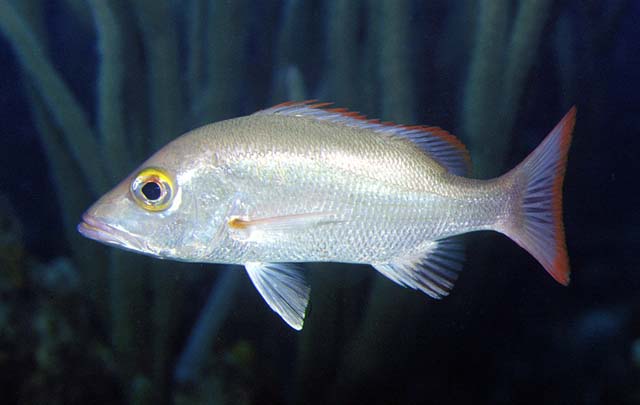| Lutjanidae (Snappers), subfamily: Lutjaninae |
| 48 cm TL (male/unsexed); max.weight: 1,300.0 g; max. reported age: 18 years |
|
reef-associated; marine; depth range 0 - 100 m |
| Western Atlantic: North Carolina, USA to northeastern Brazil (Ref. 57756), including the Gulf of Mexico (Ref. 9626). Common around the Caribbean. |
|
Dorsal spines (total): 10-10; Dorsal soft rays (total): 11-12; Anal spines: 3-3; Anal soft rays: 8-8. Lower jaw projecting slightly beyond upper jaw; lower corner of preopercle greatly projecting and strongly serrated. Preorbital bone broad, maxilla extending nearly to mid-eye level. Preopercular notch and knob moderate. Scale rows on back rising obliquely above lateral line. Back and upper side gray to dark olive grading to silvery ventrally. Usually with a black spot, about eye size, on lateral line below the anterior soft dorsal-fin rays. |
| Adults inhabit clear shallow waters over rocky bottoms in the vicinity of coral reefs, less frequently in sandy or seagrass areas. They often form large aggregations during the day. They feed at night mainly on small fish, shrimps, crabs and cephalopods (Ref. 78464). |
|
Least Concern (LC); Date assessed: 10 October 2015 Ref. (130435)
|
| reports of ciguatera poisoning |
Source and more info: www.fishbase.org. For personal, classroom, and other internal use only. Not for publication.

